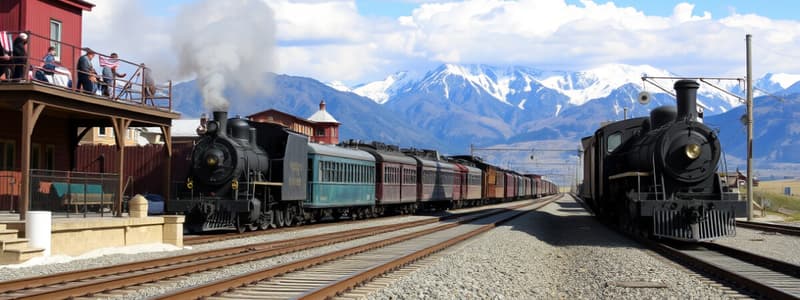Podcast
Questions and Answers
What was the purpose of the Pacific Railway Act?
What was the purpose of the Pacific Railway Act?
- To promote western agriculture
- To regulate railroad rates
- To discourage the construction of a transcontinental railroad
- To encourage the construction of a transcontinental railroad (correct)
What is the Transcontinental Railroad?
What is the Transcontinental Railroad?
A railroad connecting the West and East coasts of the continental US.
What does 'stock watering' refer to?
What does 'stock watering' refer to?
Price manipulation by strategic stock brokers.
What were railroad pools?
What were railroad pools?
Who was Thomas Alva Edison?
Who was Thomas Alva Edison?
What is vertical integration?
What is vertical integration?
What is horizontal integration?
What is horizontal integration?
What is a trust in business?
What is a trust in business?
What are interlocking directorates?
What are interlocking directorates?
What is the Bessemer Process?
What is the Bessemer Process?
What is the Gospel of Wealth?
What is the Gospel of Wealth?
What does Social Darwinism argue?
What does Social Darwinism argue?
What is the Social Gospel movement?
What is the Social Gospel movement?
What is the Morrill Act?
What is the Morrill Act?
What is 'Progress and Poverty' by Henry George about?
What is 'Progress and Poverty' by Henry George about?
What was the significance of Munn v. Illinois?
What was the significance of Munn v. Illinois?
What was the ruling in Wabash v. Illinois?
What was the ruling in Wabash v. Illinois?
What did the Interstate Commerce Act of 1887 accomplish?
What did the Interstate Commerce Act of 1887 accomplish?
What does the Sherman Antitrust Act address?
What does the Sherman Antitrust Act address?
Flashcards are hidden until you start studying
Study Notes
Pacific Railway Act
- Enacted in 1862 to promote a transcontinental railroad construction.
- Aimed to connect the western region with northeastern industrial centers.
- Involved the Union Pacific and Central Pacific railroads.
Transcontinental Railroad
- First complete railroad spanning between the east and west coasts of the U.S.
- Constructed from 1863 to 1869, totaling 1,912 miles.
- Connected the eastern U.S. rail network to the Pacific coast.
Stock Watering
- A deceptive practice where brokers inflated the perceived value of railroad stocks.
- Enabled brokers to exaggerate company profitability beyond actual asset value.
Railroad Pools
- Early cooperative agreements among powerful railroad executives.
- Allowed businesses to divide markets and share profits within designated areas.
Thomas Alva Edison
- Renowned inventor and scientist from New Jersey.
- Improved the light bulb and created devices such as the phonograph and automatic telegraph.
Vertical Integration
- Business strategy where a single entity controls all stages from raw materials to finished goods.
- Enhances efficiency and reduces costs for manufacturers.
Horizontal Integration
- The consolidation of multiple firms producing the same goods into one entity.
- Often leads to monopolization and reduced market competition.
Trust
- A coalition of companies across the same industry managed by a common board of directors.
- Facilitated market dominance, as seen with Rockefeller's Standard Oil.
Interlocking Directorates
- Practice where executives of one company sit on the boards of other firms.
- Introduced by J.P. Morgan to minimize competition in the banking sector during the 1890s.
Bessemer Process
- An innovative method for steel production that lowered costs and increased speed.
- Involved blowing hot air through molten iron to eliminate impurities.
Gospel of Wealth
- Written by Andrew Carnegie, advocating for wealthy individuals to engage in philanthropy.
- Suggested that the affluent have a moral obligation to contribute to societal good.
Social Darwinism
- Concept proposing that success in life results from natural abilities.
- Justified class disparities with the belief that the wealthy were inherently more capable.
Social Gospel
- Movement during the late 1800s/early 1900s emphasizing social responsibility and charity for salvation.
Morrill Act
- Passed in 1862, aimed at distributing western lands to fund agricultural colleges.
- Supported higher education and agricultural advancements across states.
Progress and Poverty
- Written by journalist Henry George, criticizing monopolies and advocating for economic equality.
- Blamed social issues on monopolists who profited from rising land values.
Munn v. Illinois
- 1877 Supreme Court ruling affirming federal power to regulate interstate commerce.
- Allowed states to regulate certain businesses within their borders.
Wabash v. Illinois
- 1886 Supreme Court decision that limited state control over interstate railroads.
- Declared only Congress held exclusive jurisdiction over interstate commerce.
Interstate Commerce Act
- 1887 legislation created to oversee railroad and interstate business regulation.
- Banned practices like rebates and pools and mandated public rate disclosures.
- Established the Interstate Commerce Commission for enforcement.
Sherman Antitrust Act
- First federal legislation to address monopolies and trade restrictions.
- Signed by President Harrison and utilized by Theodore Roosevelt for regulation.
- Initially misapplied against labor unions; focused on size rather than ethical practices.
Studying That Suits You
Use AI to generate personalized quizzes and flashcards to suit your learning preferences.




